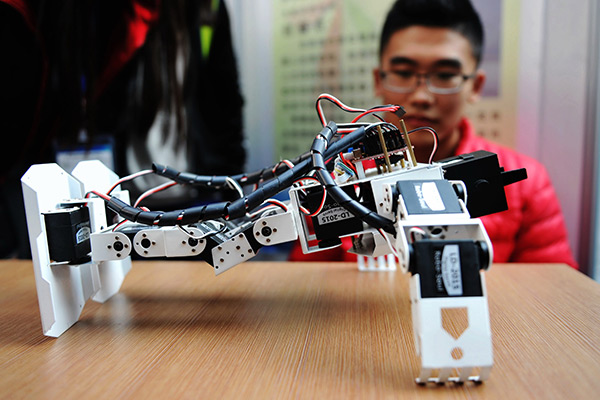Entrepreneurial activity tops big G20 members
 |
|
A voice-controlled robot designed by college students does push-ups at a show in Shandong province. [Photo/China Daily] |
The state of Chinese entrepreneurial activities is strong, according to the latest available data contained in a major international academic report.
The report, released at a press conference on Wednesday in Beijing by Tsinghua University, said that the mainland activity level in 2015 was higher than in some G20 members-the world's 20 wealthiest and emerging economies.
According to the 2015/2016 China Report from the Global Entrepreneurship Monitor, most Chinese entrepreneurs were opportunity-motivated and 64.3 percent of the respondents said they chose to pursue an opportunity as a basis for their entrepreneurial motivations, instead of starting the business out of absolute necessity. That number increased by 6.8 percentage points from five years ago.
The National Entrepreneurship Research Center of Tsinghua School of Economics and Management conducted the survey against the background of the G20.
"The G20 Entrepreneurship Action Plan considers startups as a key driver for creating decent jobs, fostering innovative ideas and boosting economic growth," said NERC Director Gao Jian, who led the project.
"Against such a background, we conducted this year's GEM China report based on existing research framework and data sources."
The boom in entrepreneurship came thanks to the mass entrepreneurship and innovation program proposed by Premier Li Keqiang in September 2014, said Zhang Jing'an, an academician at the International Eurasian Academy of Sciences.
"China is entering into the stage of innovation-driven development," he added.
The findings in the report also showed key disparities between Chinese entrepreneurs and their counterparts in developed countries.
In terms of industry sector participation, nearly 70 percent of Chinese entrepreneurs operated wholesale or retail businesses, while 8.2 percent of them provided higher-value business services such as information and communications, financial, professional and other services industries.
By contrast, the survey showed that developed countries had a higher proportion of startups in business services. For instance, the percentage in the United Kingdom stood at 35.5 percent, and in the US 32.8 percent.
NERC Deputy Director Cheng Yuan said the proportion of technology startups in China remained "significantly lower" than that of innovation-driven economies, despite more and more Chinese startups in recent years had applied new technologies to give their businesses a boost.
Global Entrepreneurship Monitor is a global study started back in 1999 by a consortium of universities to analyze entrepreneurship levels in a wide number of countries.
The main measure used is called the Total Early-Stage Entrepreneurial Activity, which assesses the percent of a working age population both about starting an entrepreneurial activity and having started one from a maximum of three years and half.
China's Total Early-Stage Entrepreneurial Activity, the indicator used to evaluate an economy's entrepreneurship condition, was 12.8 percent in 2015, according to Tsinghua University.
It was higher than that of dominant innovation-driven countries such as the United States (11.9 percent), the UK (6.9 percent), Germany (4.7 percent) and Japan (3.8 percent), according to the report.

















